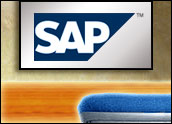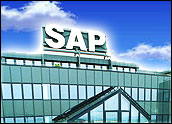
Executives at SAP will be starting off the holidays in a glum frame of mind: A federal jury handed Oracle a victory in its legal tangle with SAP, awarding it US$1.3 billion for copyright infringement — the largest-ever such award.
The damages stem from a suit Oracle filed against SAP in 2007, claiming that it made tens of thousands of illegal downloads of Oracle software, technical documentation, software updates, bug fixes, patches and custom solutions for various product lines.
SAP’s woes originated with its 2005 acquisition of TomorrowNow, a company that was formed several years ago by ex-PeopleSoft employees. The firm provided low-cost third-party support for PeopleSoft software, as well as for Siebel and JD Edwards software suites. Oracle claimed that TomorrowNow employees posed as Oracle customers with active support agreements to log onto its customer support website in order to gain access to documents it needed to lure customers away from Oracle to its own service.
SAP shut the unit down a year later, following a review of the subsidiary’s processes and Oracle’s claims. In a pretrial brief, SAP acknowledged its liability for some of Oracle’s claims, but it disputed the numbers Oracle was using to calculate its loss. SAP had in mind a figure in the tens of millions, and indeed had reserved about $160 million for damages.
The jury, clearly, thought otherwise.
Grounds for Appeal?
SAP shouldn’t hold out hope that the damages will be reduced on a possible appeal, Christopher M. Collins, a partner with Vanderpool, Frostick & Nishanian, told CRM Buyer.
“Any reduction in the verdict is likely to be fairly small unless the jury simply ignored material evidence,” which, in general, he said, is unlikely. What probably will happen is that SAP will try to structure the payment of the final award to minimize any impact on its operations.
Even if it should be immediately on the hook for the entire amount, the company should be able to ride out this particular storm with little long-term damage, said Collins.
SAP reported growth of nearly 20 percent in sales of software and related services for the third quarter and recently placed $500 million in a U.S. private placement, he noted.
The bottom line is that no purchasing manager — SAP’s prospective customer base, in other words — is likely to be dissuaded from implementing the company’s software based on these numbers alone, Collins concluded
Moral Judgment
Still, SAP’s reputation has taken a hit from this episode and that may well have an impact, Nucleus Research Vice President Rebecca Wettemann told CRM Buyer.
Even before this incident, “we have watched SAP become increasingly challenged in thought leadership in SaaS and traditional enterprise application development,” she said. “Now that there is the additional factor of questionable integrity, I think we will see an erosion of support by buyers.”
Customers must trust their entire business — including sensitive data — to enterprise vendors, she emphasized. “I can see a company wondering, ‘if SAP is admitting it did this, what else don’t we know about how it does business?'”
Certainly, government agencies making purchasing decisions are likely to be very sensitive to SAP’s wrongdoing, and consumers are likely to be concerned about their ability to receive customer support from SAP down the road, opined Jason Mazzone, a professor with the Brooklyn Law School.
“The verdict against SAP is very likely to impact sales,” he told CRM Buyer. “Few copyright infringement cases involve such brazen violations of the law.”
There also remains the risk that the Department of Justice will bring criminal charges against SAP, said Mazzone. “Criminal liability would certainly have a bigger impact on the loyalty of SAP’s customers, on SAP’s share price, and on the company’s overall financial well-being.”
Wiggle Room
That said, SAP does has some wiggle room for damage control, Mazzone said.
“The infringement was by a subsidiary of SAP, TomorrowNow, which is already defunct. At trial, SAP sought to present TomorrowNow as a maverick, operating beyond the control and knowledge of SAP executives,” he pointed out.
“While that argument did not persuade the jury, there is nothing to stop SAP from now making it to the general public,” said Mazzone, “and claiming that SAP has taken responsibility, that the bad apple has been dealt with, and it’s time to move forward.”













































